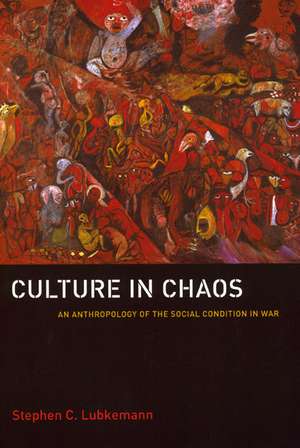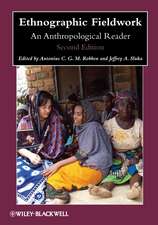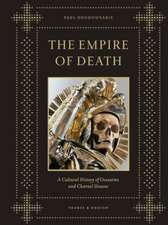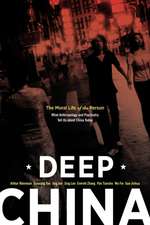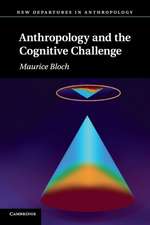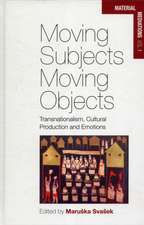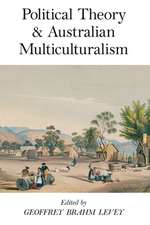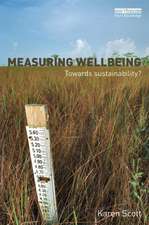Culture in Chaos: An Anthropology of the Social Condition in War
Autor Stephen C. Lubkemannen Limba Engleză Paperback – 2008
Fought in the wake of a decade of armed struggle against colonialism, the Mozambican civil war lasted from 1977 to 1992, claiming hundreds of thousands of lives while displacing millions more. As conflicts across the globe span decades and generations, Stephen C. Lubkemann suggests that we need a fresh perspective on war when it becomes the context for normal life rather than an exceptional event that disrupts it. Culture in Chaos calls for a new point of departure in the ethnography of war that investigates how the inhabitants of war zones live under trying new conditions and how culture and social relations are transformed as a result.
Lubkemann focuses on how Ndau social networks were fragmented by wartime displacement and the profound effect this had on gender relations. Demonstrating how wartime migration and post-conflict return were shaped by social struggles and interests that had little to do with the larger political reasons for the war, Lubkemann contests the assumption that wartime migration is always involuntary. His critical reexamination of displacement and his engagement with broader theories of agency and social change will be of interest to anthropologists, political scientists, historians, and demographers, and to anyone who works in a war zone or with refugees and migrants.
Lubkemann focuses on how Ndau social networks were fragmented by wartime displacement and the profound effect this had on gender relations. Demonstrating how wartime migration and post-conflict return were shaped by social struggles and interests that had little to do with the larger political reasons for the war, Lubkemann contests the assumption that wartime migration is always involuntary. His critical reexamination of displacement and his engagement with broader theories of agency and social change will be of interest to anthropologists, political scientists, historians, and demographers, and to anyone who works in a war zone or with refugees and migrants.
Preț: 324.46 lei
Nou
Puncte Express: 487
Preț estimativ în valută:
62.10€ • 67.48$ • 52.20£
62.10€ • 67.48$ • 52.20£
Carte tipărită la comandă
Livrare economică 21 aprilie-05 mai
Preluare comenzi: 021 569.72.76
Specificații
ISBN-13: 9780226496429
ISBN-10: 0226496422
Pagini: 400
Ilustrații: 1 map
Dimensiuni: 152 x 229 x 25 mm
Greutate: 0.57 kg
Editura: University of Chicago Press
Colecția University of Chicago Press
ISBN-10: 0226496422
Pagini: 400
Ilustrații: 1 map
Dimensiuni: 152 x 229 x 25 mm
Greutate: 0.57 kg
Editura: University of Chicago Press
Colecția University of Chicago Press
Notă biografică
Stephen C. Lubkemann is assistant professor of anthropology and international affairs at the George Washington University and associate editor of Anthropological Quarterly.
Cuprins
Acknowledgments
Notes on the Text
Introduction. The “Ordering of Violent Things”: War and Displacement
Section 1. Migration and Social Transformation before the War
Chapter 1. Contending with Colonialism: Migration and Resistance
Chapter 2. Other Struggles: Migration and the Transformation of Social Relations
Section 2. The Social Conditioning of War
Chapter 3. Imposing the New Mozambique: Sowing the Seeds of Postcolonial Disillusion
Chapter 4. Society and the State: Mutual Misrecognition at the Gathering of War
Chapter 5. Prosecuting Life by Other Means: The Social Logic of Violence in a Fragmented War
Section 3. The Social Condition in War
Chapter 6. Terrains of Displacement: War-time Mobility and Immobility
Chapter 7. Tambem Aqui Fazemos Amor:Living in War
Section 4. War as a Socially Transformative Condition
Chapter 8. Postconflict Displacements: The Social Problematics of Refugee Return
Chapter 9. Transnational Contentions: The Moral Economy of Postconflict Migration
Chapter 10. Where to Be an Ancestor? The Struggle for the Postconflict Social Imagination
Notes
References
Notes on the Text
Introduction. The “Ordering of Violent Things”: War and Displacement
Section 1. Migration and Social Transformation before the War
Chapter 1. Contending with Colonialism: Migration and Resistance
Chapter 2. Other Struggles: Migration and the Transformation of Social Relations
Section 2. The Social Conditioning of War
Chapter 3. Imposing the New Mozambique: Sowing the Seeds of Postcolonial Disillusion
Chapter 4. Society and the State: Mutual Misrecognition at the Gathering of War
Chapter 5. Prosecuting Life by Other Means: The Social Logic of Violence in a Fragmented War
Section 3. The Social Condition in War
Chapter 6. Terrains of Displacement: War-time Mobility and Immobility
Chapter 7. Tambem Aqui Fazemos Amor:Living in War
Section 4. War as a Socially Transformative Condition
Chapter 8. Postconflict Displacements: The Social Problematics of Refugee Return
Chapter 9. Transnational Contentions: The Moral Economy of Postconflict Migration
Chapter 10. Where to Be an Ancestor? The Struggle for the Postconflict Social Imagination
Notes
References
Recenzii
“Sharp, eloquent, and utterly persuasive, this remarkable ethnography changes the way we look at violence and war. In Lubkemann’s skillful hands, we are witness to not just resilience but the constant forging of new social fabric in the most improbable of human conditions.”
“Culture in Chaos is the product of over a decade of research in Mozambique and South Africa, and should be required reading for anyone who wants to understand the Mozambique conflict, and indeed conflict and displacement more generally. Lubkemann’s work is empirically rich and theoretically innovative, seeking to understand how and why particular forms of violence emerge as part of the ‘social condition’ of war. It reinforces the point—often ignored—that war and displacement evolve in different ways, with often unexpected outcomes.”
“Lubkemann makes a compelling case for a new kind of anthropology of war. His book will be widely read, cited, and debated not only by regional scholars, but also among academics and policymakers—in Africa and beyond—seeking to better understand the complexities of war and human displacement.”
"This is an innovative book on war, which has relevance well beyond Mozambique or even Africa. It advances a thesis that ought to change the ways in which scholars . . . approach the question of conflict--particualrly in non-western societies. It is certainly a must-read book for those who are interested in the consequences of war in southern Africa and for those who want to come to an understanding of conflict that eschews comfortable concepts and facile explanations."
"An absorbing and thought-provoking book, this monograph is sure to be of interest to those concerned not only with the history of Mozambique and its post-colonial conflict and antecedents, but also to anyone intrested in the dynamics of conflict and migration in relation to questions of agency and social action."
"This vivid ethnography is a compelling narrative of resilience and innovation, and how the experience of war fails to produce a cultural tabula rasa."
"The book presents rich historical, demographic, and ethnographic data, and addresses important concerns in political anthropology, refugee studies, and other social sciences. These include the analysis of displaceent vis-à-vis migration, the critical rethinking of the state as a primary political form, and the theorization of social agency in war. The writing is accessible, the arguments clearly repesented, and the book speaks to a broad audience of scholars interested in agency, violence, migration, and social history."
"A major contribution to the debate on the war in Mozambique, but also more generally on violent conflicts and migration flows in Africa and beyond."
"In providing a detailed analysis of the .micro-politics' of wartime social processes in Mozambique, this book also represents a new approach to the anthropology of war, which should be of interest to anyone working on violent conflict, displacement and migration."
